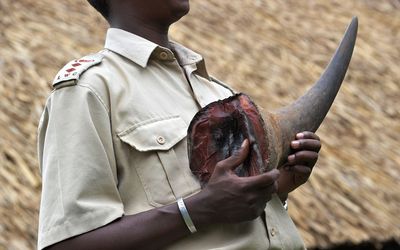WWF welcomes department’s decision to appeal rhino decision
by Wyndham Hartley,
2015-11-27 09:10:35.0
THE World Wildlife Fund (WWF) has welcomed the decision by the Department of Environment Affairs to appeal the decision of the High Court in Pretoria on Thursday to lift the ban on trading in rhino horn in SA.
The fund said in a statement on Thursday that it regretted the decision by a High Court judge to lift the ban on trade in rhino horn as a result of an application by two game farmers claiming that it was their constitutional right to trade in rhino horn.
SA is home to 80% of the world’s rhino but poaching of the animals has spiralled out of control in the past seven years with about 1,200 animals lost in 2014 alone.
"WWF regrets today’s decision by SA’s High Court to lift the ban on the domestic trade in rhino horn, which was imposed by the government in 2009 and fully welcomes the minister of environmental affairs’ prompt announcement to appeal the decision.
The fund said: "The decision means that it is now possible for individuals to buy rhino horn within SA. However, international trade in rhino horn remains prohibited under the Convention on International Trade in Endangered Species of Wild Fauna and Flora (Cites).
"This ruling is a blow to the government, which imposed the moratorium in February 2009 in response to a sharp rise in rhino poaching and concerns that the national trade was facilitating the illegal international trade in rhino horn," said Dr Jo Shaw, rhino programme manager for World Wildlife Fund SA.
Cites is scheduled to meet in SA next year and the lifting of the international trade in rhino horn is expected to be on the agenda. There is growing belief that the sale of substantial stockpiles of rhino horn will undermine the illegal black market in rhino horn. Countries in the Far East such as Vietnam and China are the main customers of the horn, which is used as a medicine.
The judge ruled that the public had not been properly informed of the decision to prohibit the trade in rhino horn and there had not been a consultative process, hence it was set aside.

Rhino horn. Picture: AFP PHOTO / ROBERTO SCHMIDT
THE World Wildlife Fund (WWF) has welcomed the decision by the Department of Environment Affairs to appeal the decision of the High Court in Pretoria on Thursday to lift the ban on trading in rhino horn in SA.
The fund said in a statement on Thursday that it regretted the decision by a High Court judge to lift the ban on trade in rhino horn as a result of an application by two game farmers claiming that it was their constitutional right to trade in rhino horn.
SA is home to 80% of the world’s rhino but poaching of the animals has spiralled out of control in the past seven years with about 1,200 animals lost in 2014 alone.
"WWF regrets today’s decision by SA’s High Court to lift the ban on the domestic trade in rhino horn, which was imposed by the government in 2009 and fully welcomes the minister of environmental affairs’ prompt announcement to appeal the decision.
The fund said: "The decision means that it is now possible for individuals to buy rhino horn within SA. However, international trade in rhino horn remains prohibited under the Convention on International Trade in Endangered Species of Wild Fauna and Flora (Cites).
"This ruling is a blow to the government, which imposed the moratorium in February 2009 in response to a sharp rise in rhino poaching and concerns that the national trade was facilitating the illegal international trade in rhino horn," said Dr Jo Shaw, rhino programme manager for World Wildlife Fund SA.
Cites is scheduled to meet in SA next year and the lifting of the international trade in rhino horn is expected to be on the agenda. There is growing belief that the sale of substantial stockpiles of rhino horn will undermine the illegal black market in rhino horn. Countries in the Far East such as Vietnam and China are the main customers of the horn, which is used as a medicine.
The judge ruled that the public had not been properly informed of the decision to prohibit the trade in rhino horn and there had not been a consultative process, hence it was set aside.





















Change: -1.13%
Change: -1.17%
Change: -0.91%
Change: -0.93%
Change: -3.50%
Data supplied by Profile Data
Change: 0.00%
Change: 0.00%
Change: -1.13%
Change: 0.00%
Change: 0.00%
Data supplied by Profile Data
Change: -0.03%
Change: 0.07%
Change: -0.01%
Change: 0.00%
Change: -0.10%
Data supplied by Profile Data
Change: 0.00%
Change: 0.00%
Change: 0.00%
Change: 0.00%
Change: 0.00%
Data supplied by Profile Data